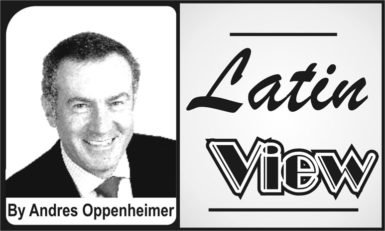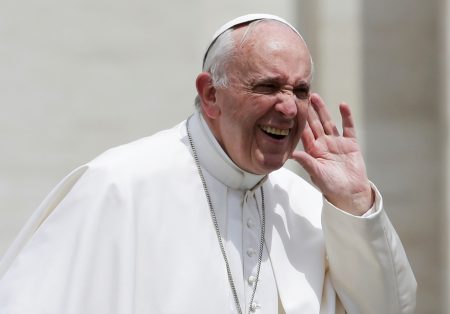Here’s the worst thing that Pope Francis could do during his Sept. 6-10 visit to Colombia: make another worthless call for peace and reconciliation in neighbouring Venezuela.
 That’s exactly what Venezuelan President Nicolas Maduro is hoping for. Maduro would love to see the Pope reiterate his calls for a “national dialogue” to solve Venezuela’s political and economic crisis. It would help Venezuela’s strongman drive international attention away from his latest steps to turn his country into a full-blown dictatorship.
That’s exactly what Venezuelan President Nicolas Maduro is hoping for. Maduro would love to see the Pope reiterate his calls for a “national dialogue” to solve Venezuela’s political and economic crisis. It would help Venezuela’s strongman drive international attention away from his latest steps to turn his country into a full-blown dictatorship.
In recent weeks, Maduro has effectively killed the country’s National Assembly, which the opposition had won by a landslide despite widespread government dirty tricks in 2015 legislative elections. Maduro created his own super-Congress, which he calls the Constituent Assembly, whose hand-picked legislators have the power to rewrite the Constitution and to supersede the democratically-elected National Assembly.
One of the first steps by Maduro’s Constituent Assembly was to order the firing of Venezuela’s attorney general, Luisa Ortega, a former government supporter who denounced the assembly as unconstitutional. She has since fled the country.

In addition, the Constituent Assembly has launched an investigation into National Assembly President Julio Borges, an opposition leader, for allegedly encouraging U.S. financial sanctions against Venezuela and its leaders. The National Assembly and the former attorney general were Venezuela’s last remaining independent institutions.
The Vatican has been partly responsible for Maduro’s slow-motion coup. For more than a year, while more than 120 people died and hundreds were wounded and arrested in street protests, Francis called for peace, instead of denouncing Maduro’s systematic violations of the constitution and his termination of the last vestiges of democracy.
Early this year, Francis made things worse when he failed to explicitly criticize Maduro’s public vow to convene his Constituent Assembly. For five months, Francis failed to join Latin American countries, the European Union and the United States in demanding that Maduro call off his plans to create his Constituent Assembly.
Francis only did that on Aug. 4, the very day that Maduro inaugurated the assembly. But it was too little, too late.
Previously, Francis had backed a disastrous mediation mission in Venezuela, led by former Spanish President Jose Luis Rodriguez Zapatero, who came across as a Maduro emissary rather than a mediator. The mediation commission, which also had a U.S. blessing, only helped Maduro win time while he was demolishing what was left of Venezuela’s independent institutions.
While professing to be negotiating, Maduro took hundreds of political prisoners and closed radio and television stations before moving against the National Assembly and the former attorney general.
What should the Pope say about Venezuela during his trip to Colombia? Obviously, he cannot remain mum. Venezuela’s political and economic chaos has created a wave of refugees into Colombia, which is making banner headlines there.
Up to 25,000 Venezuelans cross over to the Colombian border town of Cucuta every day to buy basic foodstuffs, and many of them stay in Colombia to escape from rising violence and an estimated 720 percent annual inflation rate, the world’s highest. This exodus has driven Colombian President Juan Manuel Santos to step up his criticism of Maduro, whom he had once called “my new friend” and now calls a dictator.
In Colombia, the Pope should build on his Aug. 4 statement about Venezuela, in which he called for “creating the conditions for a negotiated solution” in Venezuela.
The Pope should say without ambiguity that to meet such conditions, Maduro must allow an independent electoral tribunal so that Venezuelans can have free and fair elections, free the nearly 600 political prisoners, scrap the Constituent Assembly and restore the constitutional powers of the opposition majority National Assembly.
“Pope Francis needs to make things right after having involved himself in a failed negotiation,” says Carlos Vecchio, an exile political leader of Venezuela’s Voluntad Popular party. “He has a pending debt with Venezuela.”
Francis should spell out the concrete steps for Maduro to start a process that can lead to free and fair elections in Venezuela. Anything else will be a tacit endorsement of Maduro’s moves to grab absolute power.






